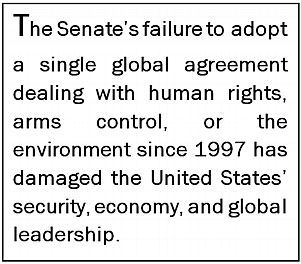"The children were all asleep in bed and I was just going off to sleep...when I heard people outside saying chemical bombs were being dropped around us," said Samer, a Syrian refugee. His children survived the chemical weapons attack in Ghouta on the outskirts of Damascus in 2013.
 Thankfully, by mid-April of this year, 93% of the Syrian chemical weapon stockpiles have been removed by the Organization for the Prohibition of Chemical Weapons, the watchdog arm of the Chemical Weapons Convention. The United States and other parties to this treaty had worked through the UN Security Council and pressured Syria to accede to the Convention. They are now pushing for the remaining chemicals to be destroyed.
Thankfully, by mid-April of this year, 93% of the Syrian chemical weapon stockpiles have been removed by the Organization for the Prohibition of Chemical Weapons, the watchdog arm of the Chemical Weapons Convention. The United States and other parties to this treaty had worked through the UN Security Council and pressured Syria to accede to the Convention. They are now pushing for the remaining chemicals to be destroyed.
But despite the successful use of international law to take these horrendous weapons out of play in the Syrian civil war, another kind of war is being fought within the United States. The frontlines of the War on International Law stretch from the Senate floor to the living rooms of home-schoolers.
A coordinated and well-funded opposition is doing everything it can to stop the US from ratifying any multilateral treaties. And, to the detriment of our nation and the world, they're winning. The Senate's failure to adopt a single global agreement dealing with human rights, arms control, or the environment since 1997--when it agreed to the Chemical Weapons Convention--has damaged the United States' security, economy, and global leadership.
One of our most cherished values as Americans is the idea that everyone is equal under the law; when nations around the world share that view and agree on what the law is, we are all better off. When we lose sight of that vision, we lose the support of others--often just when we need it most.
Treaties are common sense tools that get things done. The international treaties the United States has helped to shape make international air travel safe and ensure global mail and phone networks work. They outlaw deadly weapons and ozone-destroying chemicals. Treaties fight illegal drugs, and promote basic values such as ending child labor or the use of child soldiers.
The US has played a key role in crafting the Women's Equality Treaty (CEDAW), the Law of the Sea Treaty, the Disability Treaty, the Arms Trade Treaty, the Comprehensive Test Ban Treaty, and many other important agreements that reflect core US ideals.
Unfortunately, the Senate's inability to ratify these accords has put our nation in an uncomfortable and often embarrassing situation. For example, the US is the only nation in the world with a functioning government that has not ratified the Rights of the Child Treaty. It is one of seven nations, including Iran, Sudan, and Somalia that has not adopted the Women's Equality Treaty. By refusing to ratify treaties, the US has less influence on global problem solving.
Treaty opponents include think tanks like the Heritage Foundation; membership organizations such as the National Rifle Association, Tea Party groups, and the Home School Legal Defense Association; and communications outlets like Fox News and The Washington Times. They have formed an integrated echo chamber that shares strategy, messaging, and talking points.
As portrayed in the 2012 Republican platform, they think these agreements create rules that allow "foreigners" to make law that binds the United States.
Together they have cajoled enough conservative Republican senators to believe that multilateral treaties represent a grave threat to American sovereignty and democracy (and to their re-election) - making passage close to impossible.
During the last two decades, I have worked on many ratification efforts, co-chaired taskforces, and recently brought together the leaders of six major coalitions seeking Senate adoption of specific agreements. We have learned much:
- Treaty opponents do not discriminate between human rights, women's rights, arms control, or the environment. They oppose all multilateral agreements. Those who work for stronger international laws must work together more effectively.
The US and Russia continue to pressure Syria to turn over the remaining nerve agent, Sarin. This is one of the few remaining areas where Moscow and Washington are collaborating. It is one more example of why international cooperation is essential for a safer and more secure world. Whether you care about stopping climate change, getting rid of nuclear weapons, ending genocide or support human rights for all, it is past time to acknowledge and stop our self-destructive war on international law.